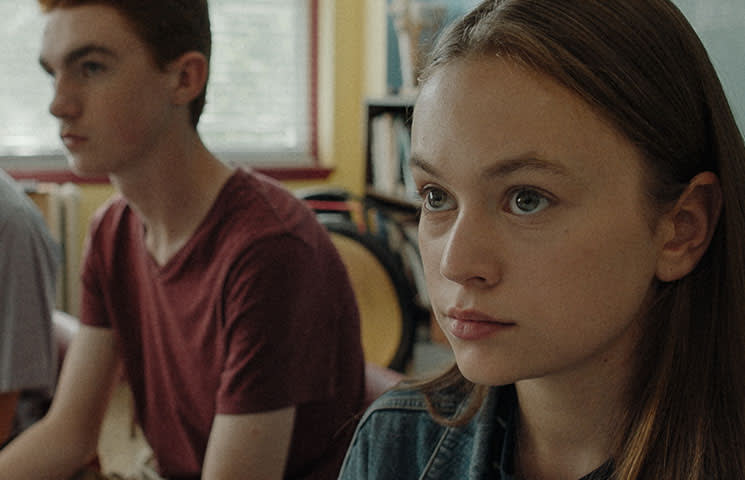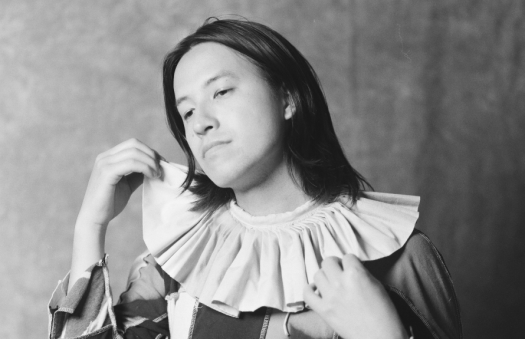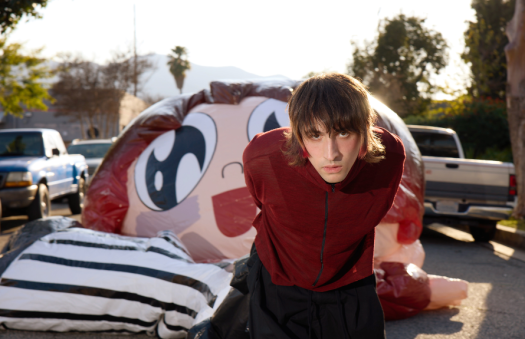There's so much that Black Conflux gets right that it's a downright shame to see all the work come undone in its final moments.
The film spends most of its time building up to a tense encounter between its two leads who, until the final scene, are largely unconnected. As bookish high schooler Jackie (Ella Ballentine) tries to fit in with her peers, low-achieving Dennis (Ryan McDonald) struggles to keep his schizophrenia at bay. Propelled by Jackie's frustration with misogynist party culture and Dennis's difficulties with socializing, dating and sex, manifesting in hallucinations, it feels painfully inevitable to see where the fateful encounter promised by the premise is going — until it isn't.
In its final scenes, the film weaponizes the threat of abuse as a way to drive the tension forward — it's an uncomfortable turn made even worse with the anticlimactic ending that ultimately occurs.
The film's strong beginning and middle showcases plenty of strengths: strong acting, natural dialogue and rich cinematography. Set in small-town Newfoundland circa 1987, when everyone wore acid-washed denim and April Wine ruled radio waves, Black Conflux shows the struggles of its characters in simple, relatable beats. Its depictions of teenage female friendship and schizophrenia are authentic, organic and tasteful, as are the ways it depicts the two leads feeling alienated from the world around them.
While Jackie's storyline of feeling torn by her studious, extracurricular nature and her pot-smoking, class-skipping friends mines traditional territory, it's bolstered by the strength of Dorsey's script and directing, along with standout performances by Ballentine as Jackie and Degrassi's Olivia Scriven as her brazen best friend, Amber. Though Dennis's storyline is more repetitive and less compelling, McDonald portrays Dennis with plenty of nuance as he ambles about, trying to maintain his sanity throughout psychotic breaks. The film's strong visual style deftly blurs the line between reality and Dennis's delusions.
But while Jackie and Dennis's storylines are cleverly paralleled throughout the film, the countdown clock to their inevitable (and ultimately anticlimactic) convergence overpowers the film's final act.
It's really disappointing, as the rest of the film sets up the framework of a slice of life meditation on the perils of small-town isolation. But in the end, the ultimately fruitless stylistic choice overrides the substance of the film.
(Band With Pictures / Panoramic Pictures)The film spends most of its time building up to a tense encounter between its two leads who, until the final scene, are largely unconnected. As bookish high schooler Jackie (Ella Ballentine) tries to fit in with her peers, low-achieving Dennis (Ryan McDonald) struggles to keep his schizophrenia at bay. Propelled by Jackie's frustration with misogynist party culture and Dennis's difficulties with socializing, dating and sex, manifesting in hallucinations, it feels painfully inevitable to see where the fateful encounter promised by the premise is going — until it isn't.
In its final scenes, the film weaponizes the threat of abuse as a way to drive the tension forward — it's an uncomfortable turn made even worse with the anticlimactic ending that ultimately occurs.
The film's strong beginning and middle showcases plenty of strengths: strong acting, natural dialogue and rich cinematography. Set in small-town Newfoundland circa 1987, when everyone wore acid-washed denim and April Wine ruled radio waves, Black Conflux shows the struggles of its characters in simple, relatable beats. Its depictions of teenage female friendship and schizophrenia are authentic, organic and tasteful, as are the ways it depicts the two leads feeling alienated from the world around them.
While Jackie's storyline of feeling torn by her studious, extracurricular nature and her pot-smoking, class-skipping friends mines traditional territory, it's bolstered by the strength of Dorsey's script and directing, along with standout performances by Ballentine as Jackie and Degrassi's Olivia Scriven as her brazen best friend, Amber. Though Dennis's storyline is more repetitive and less compelling, McDonald portrays Dennis with plenty of nuance as he ambles about, trying to maintain his sanity throughout psychotic breaks. The film's strong visual style deftly blurs the line between reality and Dennis's delusions.
But while Jackie and Dennis's storylines are cleverly paralleled throughout the film, the countdown clock to their inevitable (and ultimately anticlimactic) convergence overpowers the film's final act.
It's really disappointing, as the rest of the film sets up the framework of a slice of life meditation on the perils of small-town isolation. But in the end, the ultimately fruitless stylistic choice overrides the substance of the film.




